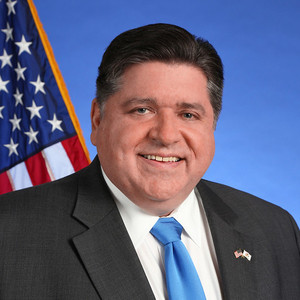Illinois governor signs bill establishing SAF tax credit

Illinois Gov. J.B. Pritzker
February 7, 2023
BY Erin Krueger
Illinois Gov. JB Pritzker on Feb. 3 signed the Invest in Illinois Act. The legislative package, in part, creates a $1.50 per gallon sustainable aviation fuel (SAF) purchase tax credit to support the supply and use of SAF within the state.
The SAF tax credit will become effective June 1, 2023, and is currently in place through Jan. 1, 2033. The credit applies to SAF sold to or used by an air carrier. To be eligible for the credit, SAF must achieve a 50 percent lifecycle greenhouse gas (GHG) reduction when compared to petroleum-based jet fuel using either the lifecycle methodology for SAF developed by the International Civil Aviation Organization or the most recent version of Argonne National Laboratory’s GREET model.
Advertisement
Prior to June 1, 2028, the credit can be claimed for fuel derived from biomass resources, waste streams, renewable energy sources, or gaseous carbon oxides. Beginning on June 1, 2028, the fuel must also be derived from domestic biomass resources. Fuel produced from palm feedstock is not eligible for the credit. The new law also includes a provision that states until July 1, 2033, on an annual basis, no credit may be earned by an air carrier for soybean oil-derived SAF once air carriers in the state have collectively purchased SAF containing 10 million gallons of soybean oil feedstock.
LanzaJet has spoken out in support of the newly created SAF tax credit. “The passage of the Sustainable Aviation Fuel Purchase Credit positions Illinois as a leader in the energy transition,” said Jimmy Samartzis, CEO of LanzaJet. “These types of incentives accelerate the development of this new industry as we work hard to decarbonize the transportation sector. LanzaJet is excited to play a role in bringing SAF to new consumers across Illinois, and we encourage other states to support the sustainable fuels industry with similar measures and help meet the nation’s climate change goals.”
Advertisement
Related Stories
Calumet Inc. on Aug. 8 confirmed its Montana Renewables biorefinery is currently running at full capacity. An initial phase of the company’s MaxSAF initiative remains on track to boost SAF capacity to up to 150 MMgy by mid-2026.
Marathon Petroleum Corp. on Aug. 5 released second quarter financial results, reporting improved EBITDA for its renewable diesel segment. The company primarily attributed the improvement to increased utilization and higher margins.
Chevron Corp. on Aug. 1 confirmed the company started production at the Geismar renewable diesel plant in Louisiana during the second quarter after completing work to expand plant capacity from 7,000 to 22,000 barrels per day.
California’s new specified source feedstock attestation requirement: A critical new compliance step for renewable fuel producers
As of July 2025, California’s SCFS requires renewable fuel producers using specified source feedstocks to secure attestation letters reaching back to the point of origin. This marks a significant shift in compliance expectations.
The public comment period on the U.S. EPA’s proposed rule to set 2026 and 2027 RFS RVOs and revise RFS regulations closed Aug. 8. Biofuel groups have largely expressed support for the proposal but also outlined several ways to improve the rulemaking.
Upcoming Events










